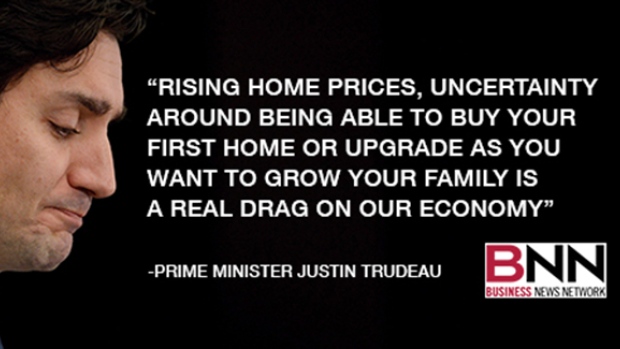Skyrocketing home prices in Toronto and Vancouver are creating headwinds for Canada’s economy, Prime Minister Justin Trudeau told BNN in an exclusive interview.
"Rising home prices, uncertainty around being able to buy your first home or upgrade as you want to grow a family is a real drag on our economy and a real drag on Canadians’ opportunities,” he said.
Ottawa is taking a close look at the forces driving those markets higher before it acts, he said. “There are all sorts of theories about what is going on in Vancouver and Toronto – there is more data we need.”
Trudeau’s comments echo statements from Finance Minister Bill Morneau on Wednesday. “We’re making sure that we have a deep dive into the information to ensure that any considerations we have for change are evidence-based,” Morneau told reporters in Toronto.
The benchmark price of a home in Toronto hit $635,700 in May – marking a 15 per cent gain from a year earlier. A similar home in Vancouver sells for $889,100 – up nearly 30 per cent from last year, according to the Real Estate Board of Greater Vancouver.
Trudeau acknowledged the federal government has limited ability to cool hot local housing markets. Earlier this year Ottawa brought in tighter down payment rules that appear to have had little impact. “When you talk about federal government action we have such heavy levers that impact the entire country; we have to be very careful about how we engage,” he said.
Some observers blame the increase in home prices on the influx of foreign money into Toronto and Vancouver, and are calling on Ottawa to take action to limit those inflows. In its recent budget, the Liberal government earmarked $500,000 to gather data on foreign money in the real estate market.
Canada must be cautious about moving to stop foreign investment while ensuring the investment is good for this country’s economy, Trudeau said. “We have to draw in foreign investment,” he said, “But the way we welcome foreign investment is by having clear predictable frameworks, and by being unabashed about making sure that it’s in the interest of Canadians, of Canadian jobs, of Canadian economic growth and prosperity.”

Trudeau was also asked about a variety of other topics facing Canada’s economy. Here are some highlights from his interview with BNN
On the importance of oil pipelines:
“It’s the responsibility of a Canadian Prime Minister to get its resources to market. But what the last government didn’t understand is you can’t just focus on the economy and ignore the environmental concerns that not just Canadians have but our allies have as well.”
On Donald Trump’s trade rhetoric:
“One thing we see during any election campaign is there is a lot of protectionist talk. That’s certainly what we are seeing now from the United States – that’s the way the narrative is going. I think it is important that Canada and others stand against that…. We have lots of challenges we need to work on together – fixing NAFTA isn’t one of them.”
On Trump saying he would approve Keystone XL but wants “a better deal”:
“In an election campaign there are a lot of things said and a lot of commitments made. I look forward to working with whoever gets elected and we’ll deal not with hypothetical ‘what-ifs’ but actual proposals then. But there is no question that Canada has to diversify our resources and try to get our resources to tidewater.
On Bombardier’s request for financial aid:
“I’m not going to negotiate in public but I have said -- and I am going to continue to say -- Bombardier produces an excellent airplane in that CSeries. I believe in a short-term, medium-term and long-term future for Canada’s aerospace industry. These are great jobs, this is a strong position to have on the world stage and I am really hopeful we will be able to come to an agreement with Bombardier.”












